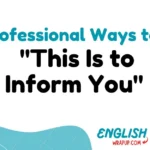Welcome to the world of idioms, where words carry deeper meanings and expressions convey sentiments beyond their literal interpretations. Idioms play a crucial role in language, adding richness and nuance to communication.
They provide a colorful way to express thoughts, feelings, and intentions, making conversations more engaging and dynamic.
In the realm of professional and everyday communication, idioms are particularly valuable. They allow us to convey empathy, support, and assistance in a manner that resonates with others. One commonly used phrase in this context is “Hope This Helps.
” While this phrase is straightforward and widely understood, there are numerous alternatives that can express similar sentiments with varying degrees of warmth and sincerity. Let’s explore 25 engaging ways to offer assistance and support to others.
Is it Professional to Say “Hope This Helps”?
Appropriate Contexts
- Informal Communication: In casual emails or messages within a familiar work environment, using “Hope this helps” can be acceptable.
- Quick Responses: When providing brief assistance or information in a professional setting where formality is not required, such as internal team communication or quick email exchanges.

Potential Pitfalls
- Level of Formality: In more formal or client-facing communications, “Hope this helps” may come across as too casual or dismissive.
- Lack of Confidence: It can sometimes convey uncertainty about the helpfulness of the information provided, which may not inspire confidence in the recipient.
Alternatives
- Polite Closing: Use a more neutral or polite closing that maintains professionalism without being overly formal, such as “Please let me know if you need further assistance” or “Feel free to reach out if you have any questions.”
- Express Confidence: If you’re confident that your response is helpful, you can simply state, “I’m glad I could assist” or “I trust this information is helpful.”
Example Revisions
Original: “Hope this helps. Let me know if you need anything else.” Revised: “Please let me know if you have any further questions or require additional assistance.”
List of Professional Ways to Say “Hope This Helps”
- Trust this proves useful
- I hope this serves you well
- Let me know if this assists
- Wishing you find this beneficial
- Hope this comes in handy
- I trust this provides assistance
- Hopefully, this is helpful
- I hope this offers some insight
- Let me know if you need further assistance
- I trust this meets your needs
- Hope this proves beneficial to you
- I hope this proves valuable
- Let me know if you have any questions
- Wishing you success with this information
- I hope this aids you in your endeavors
- Trust this comes of use
- Let me know if there’s anything else I can do
- I hope this information proves fruitful
- I trust this answers your query
- Let me know if you require additional clarification
- Hope this assists you in your task
- I hope this information proves helpful
- Let me know if you need further assistance
- I hope this proves to be of assistance
- Wishing you luck with this information
Trust this proves useful
When someone says “Trust this proves useful,” they are expressing confidence that the information or assistance they provided will be beneficial to the recipient. It conveys a sense of trust and assurance in the usefulness of what has been offered. This idiom is often used in formal settings, such as professional emails or reports, to convey professionalism and confidence.
Example:
“Here are the updated guidelines for the project. Trust this proves useful as you finalize your plans.”
I hope this serves you well
“I hope this serves you well” expresses a genuine wish for the recipient to benefit from the information or assistance provided. It conveys a sense of goodwill and sincerity, indicating a desire for the recipient’s success or satisfaction. This idiom can be used in both formal and informal settings to convey helpfulness and support.
Example:
“Attached is the user manual for the new software. I hope this serves you well as you navigate its features.”
Let me know if this assists
“Let me know if this assists” invites the recipient to provide feedback on the usefulness of the information or assistance provided. It conveys a willingness to offer further help if needed and emphasizes the importance of the recipient’s satisfaction. This idiom is commonly used in professional settings to encourage open communication and collaboration.
Example:
“I’ve compiled the research findings for your review. Let me know if this assists in your decision-making process.”
Wishing you find this beneficial
“Wishing you find this beneficial” expresses a sincere wish for the recipient to derive value or benefit from the information or assistance provided. It conveys a sense of goodwill and positivity, indicating a desire for the recipient’s success or well-being. This idiom is suitable for both formal and informal settings, emphasizing a positive outcome.
Example:
“Attached are the project proposals for your consideration. Wishing you find this beneficial as you make your decision.”
Hope this comes in handy
“Hope this comes in handy” expresses a casual and friendly wish for the recipient to find the information or assistance useful in a practical sense. It conveys a sense of optimism and informality, indicating a desire to be helpful in a down-to-earth manner. This idiom is commonly used in informal settings, such as conversations among friends or colleagues.
Example:
“I’ve shared the contact details for the vendors we discussed. Hope this comes in handy when you’re ready to reach out.”
I trust this provides assistance
“I trust this provides assistance” expresses confidence that the information or assistance provided will be helpful to the recipient. It conveys a sense of trust and reliability, indicating a belief in the effectiveness of what has been offered. This idiom is often used in formal settings to convey professionalism and competence.
Example:
“Enclosed are the instructions for setting up the new equipment. I trust this provides assistance as you get started.”
Hopefully, this is helpful
“Hopefully, this is helpful” expresses a hopeful expectation that the information or assistance provided will be beneficial to the recipient. It conveys a sense of optimism and positivity, indicating a desire for a positive outcome. This idiom is suitable for both formal and informal settings, emphasizing a friendly and supportive tone.
Example:
“Here’s the agenda for tomorrow’s meeting. Hopefully, this is helpful in preparing for our discussions.”
I hope this offers some insight
“I hope this offers some insight” expresses a genuine wish for the recipient to gain valuable understanding or knowledge from the information provided. It conveys a sense of sincerity and helpfulness, indicating a desire to contribute positively to the recipient’s understanding. This idiom is commonly used in professional settings to encourage thoughtful consideration and analysis.
Example:
“Attached are the market research findings for your review. I hope this offers some insight into consumer preferences.”
Other Ways To Say “It Was a Pleasure Meeting You”
Let me know if you need further assistance
“Let me know if you need further assistance” invites the recipient to seek additional help or clarification if needed. It conveys a willingness to provide ongoing support and assistance as required. This idiom is commonly used in professional settings to encourage open communication and ensure the recipient’s needs are met.
Example:
“I’ve provided the initial draft of the report. Let me know if you need further assistance with revisions or additions.”
I trust this meets your needs
“I trust this meets your needs” expresses confidence that the information or assistance provided fulfills the recipient’s requirements or expectations. It conveys a sense of assurance and reliability, indicating a belief that the offering is sufficient. This idiom is often used in formal settings to convey professionalism and competence.
Example:
“Please review the proposed timeline for the project. I trust this meets your needs in terms of deadlines and milestones.”
Hope this proves beneficial to you
“Hope this proves beneficial to you” expresses a sincere wish for the recipient to derive value or benefit from the information or assistance provided. It conveys a sense of optimism and goodwill, indicating a desire for the recipient’s success or satisfaction. This idiom is suitable for both formal and informal settings, emphasizing a positive outcome.
Example:
“I’ve shared the best practices document for your reference. Hope this proves beneficial to you as you streamline your processes.”
I hope this proves valuable
“I hope this proves valuable” expresses a genuine wish for the recipient to find the information or assistance valuable or worthwhile. It conveys a sense of sincerity and helpfulness, indicating a desire to contribute positively to the recipient’s endeavors. This idiom is commonly used in professional settings to encourage thoughtful consideration and application.
Example:
“Attached are the case studies for your review. I hope this proves valuable as you analyze market trends and opportunities.”
Let me know if you have any questions
“Let me know if you have any questions” invites the recipient to seek clarification or additional information if needed. It conveys a willingness to provide further assistance and support as required. This idiom is commonly used in professional settings to encourage open communication and ensure understanding.
Example:
“I’ve outlined the project requirements in the attached document. Let me know if you have any questions or need further clarification.”
Wishing you success with this information
“Wishing you success with this information” expresses a sincere wish for the recipient to achieve success or favorable outcomes using the provided information. It conveys a sense of optimism and encouragement, indicating a belief in the recipient’s abilities. This idiom is suitable for both formal and informal settings, emphasizing a positive and supportive tone.
Example:
“Here are the training materials for the new software. Wishing you success with this information as you enhance your skills.”

I hope this aids you in your endeavors
“I hope this aids you in your endeavors” expresses a genuine wish for the recipient to benefit from the information or assistance provided in their pursuits or endeavors. It conveys a sense of support and encouragement, indicating a desire for the recipient’s success or progress. This idiom is commonly used in professional settings to offer assistance and support.
Example:
“I’ve compiled the research findings for your project. I hope this aids you in your endeavors as you develop your strategies.”
Trust this comes of use
“Trust this comes of use” expresses confidence that the information or assistance provided will be beneficial or helpful to the recipient. It conveys a sense of trust and reliability, indicating a belief in the usefulness of what has been offered. This idiom is often used in formal settings to convey professionalism and confidence.
Example:
“Here’s the template for the project proposal. Trust this comes of use as you outline your approach.”
Let me know if there’s anything else I can do
“Let me know if there’s anything else I can do” invites the recipient to seek additional help or support if needed. It conveys a willingness to provide further assistance and accommodate the recipient’s needs. This idiom is commonly used in professional settings to ensure the recipient’s satisfaction and address any remaining concerns.
Example:
“I’ve provided the budget projections for the upcoming quarter. Let me know if there’s anything else I can do to support your planning process.”
Hope this information proves fruitful
“Hope this information proves fruitful” expresses a sincere wish for the recipient to derive beneficial results or outcomes from the provided information. It conveys a sense of optimism and positivity, indicating a desire for the recipient’s success or progress. This idiom is suitable for both formal and informal settings, emphasizing a positive and supportive tone.
Example:
“Attached are the market analysis reports. Hope this information proves fruitful as you make strategic decisions.”
I trust this answers your query
“I trust this answers your query” expresses confidence that the information or assistance provided addresses the recipient’s question or inquiry satisfactorily. It conveys a sense of trust and reliability, indicating a belief in the accuracy and relevance of what has been offered. This idiom is often used in formal settings to convey professionalism and competence.
Example:
“Please review the contract terms outlined in the attached document. I trust this answers your query regarding our agreement.”
Let me know if you require additional clarification
“Let me know if you require additional clarification” invites the recipient to seek further explanation or details if needed. It conveys a willingness to provide further assistance and ensure the recipient’s understanding. This idiom is commonly used in professional settings to promote clear communication and address any lingering uncertainties.
Example:
“I’ve summarized the key findings from the market research. Let me know if you require additional clarification on any of the data points.”
Hope this assists you in your task
“Hope this assists you in your task” expresses a sincere wish for the recipient to find the information or assistance helpful in completing their task or objective. It conveys a sense of support and encouragement, indicating a desire for the recipient’s success or progress. This idiom is suitable for both formal and informal settings, emphasizing a positive and supportive tone.
Example:
“I’ve outlined the steps for completing the project milestones. Hope this assists you in your task as you work towards your goals.”
I hope this information proves helpful
“I hope this information proves helpful” expresses a genuine wish for the recipient to find the provided information or assistance useful or beneficial. It conveys a sense of sincerity and helpfulness, indicating a desire to contribute positively to the recipient’s endeavors. This idiom is commonly used in professional settings to offer assistance and support.
Example:
“Attached are the resource links for further reading. I hope this information proves helpful as you delve deeper into the topic.”
Let me know if you need further assistance
“Let me know if you need further assistance” invites the recipient to seek additional help or support if needed. It conveys a willingness to provide ongoing assistance and address any remaining concerns. This idiom is commonly used in professional settings to ensure the recipient’s satisfaction and facilitate a smooth resolution.
Example:
“I’ve provided the troubleshooting guide for the software issues. Let me know if you need further assistance in resolving any technical challenges.”
I hope this proves to be of assistance
“I hope this proves to be of assistance” expresses a genuine wish for the recipient to find the provided information or assistance helpful or beneficial. It conveys a sense of sincerity and helpfulness, indicating a desire to support the recipient’s needs. This idiom is suitable for both formal and informal settings, emphasizing a friendly and supportive tone.
Example:
“Here are the contact details for the support team. I hope this proves to be of assistance in addressing your concerns.”
Wishing you luck with this information
“Wishing you luck with this information” expresses a sincere wish for the recipient to achieve favorable outcomes or results using the provided information. It conveys a sense of support and encouragement, indicating a belief in the recipient’s abilities. This idiom is suitable for both formal and informal settings, emphasizing a positive and supportive tone.
Example:
“I’ve shared the best practices document for your review. Wishing you luck with this information as you implement new strategies.”
Conclusion :
Understanding and using idioms like these not only adds depth to your language but also enhances your ability to connect with others effectively.
Whether you’re offering assistance, expressing gratitude, or conveying good wishes, choosing the right idiom can convey your sentiments with clarity and impact.

I’m Olivia Martinez, the educational mind behind “English WRAP Up.” I’ve had a blast teaching and grading English tests like TOEFL, IELTS, BULATS, FCE, CAE, and PTEG. At English WRAP Up, we’re dedicated to turning your exam preparation into a success story. Let’s make your English skills shine—join me in the educational journey at English WRAP Up!



